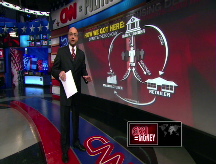NYC real estate defies gravity - so far
Manhattan home prices increase despite the financial market's turmoil, but it doesn't look like they can buck the national trend much longer.
NEW YORK (CNNMoney.com) -- Home prices in Manhattan held up remarkably well in the fourth quarter, despite the economic crisis.
Reports released Tuesday by four of the city's biggest real estate agencies showed that the average price of condos and co-ops sold during the three months ended Dec. 31 actually increased compared with a year ago.
But signs of weakness are beginning to emerge; sales volume was down a whopping 40% from the fourth quarter of 2008, according to New York brokerage the Corcoran Group.
"We're starting to see the market erode," said Jonathan Miller, of Miller Samuel, which compiles the market analysis for Prudential Douglas Elliman. "The fourth quarter didn't capture the full brunt of [the financial market turmoil]. We'll see that in the first-quarter statistics of 2009."
The median sale price of an apartment in Manhattan jumped 8% from a year ago, to $895,000, according to brokers Halstead and Brown Harris Stevens. Prudential Douglas Elliman pegged the increase at 5.9% to $900,000, while the Corcoran Group put it at 3%, to $937,000.
But according to Miller, much of these increases reflected sales in new, high-priced developments. With a median price of nearly $2 million, these units are generally pricier to begin with than existing Manhattan apartments. And many of these apartments were presold a year or two ago, when the real estate market was still red hot.
On average, the new construction deals that were closed in the fourth quarter of 2008 went into contract in November 2007, when the economy was in considerably better shape, according to Halstead's chief economist Gregory Heym.
A more accurate gauge of the Manhattan real estate market's health are sales of existing apartments.
"The focus should be on resales," Miller said, "rather than new developments, which skewed the data higher."
He pointed out that prices of resold existing homes dropped 3.6% during the fourth quarter compared with the same period in 2007. And sale prices for homes that went into contract during the fourth quarter but have not yet closed are down 20% since August, the last month before the financial markets got clobbered.
Plus, the average time that an apartment sat on the market waiting to sell climbed to 100 days, up 16 days from the fourth quarter of 2007, according to Halstead.
A severe slump could be around the corner, since New York's economy and the health of its housing market rely heavily on the financial sector.
In September, Lehman Bros. declared bankruptcy and, since then, several other investment banks have been sold, announced huge layoffs and slashed bonuses.
"A little over 20,000 securities industry people have disappeared from the payrolls so far, about a third of the projected layoffs," said Heym.
Despite these events, New York's economy is still reasonably strong, according to Pam Liebman, CEO of the Corcoran Group. For example, although the city's unemployment rate has increased to 6.3%, it's still lower than the national rate of 6.5%.
"Fundamentals haven't changed that much, but the psychology has," she said. "There's more fear now, of price drops, of job losses, of bonus cutbacks and of losing money in investments."
Stagnant prices alone can alter market psychology. During the boom, rising prices gave potential buyers a sense of urgency and confidence that's lacking in today's market.
"The feeling was 'Buy today and it will appreciate tomorrow,'" said Liebman. "That feeling is gone."
Now, buyers are holding out for better deals. Meanwhile sellers are still seeking the same kinds of prices paid at the height of the market.
"This disconnect is worse than I've ever seen it," said Miller. "Typically, when the market turns, sellers are two quarters or so behind. Now, sellers are a year behind. Meanwhile buyers are waiting for the economy to shake out."
On the plus side, many of the forces that have hurt other housing markets have had little impact on Manhattan, according to Heym.
Few New Yorkers used exotic mortgage products to buy apartments, for example. These were the kind of loans that led to the huge foreclosure problems in California, Nevada, Florida and other boom markets. Co-op boards and even many condo owner associations simply don't allow them, and they often reject potential buyers with weak financial profiles.
That means that most apartment owners in New York have substantial home equity, and will still retain equity even if home values decline 10% or so. That helps stabilize the housing market.
And New York has been spared the kind of overdevelopment that left housing inventories in Sun Belt states bloated. There's simply very limited opportunity to acquire land to build new housing on a 23-square-mile island that is already the most densely populated county in the United States.
Add to that a population that continues to expand and it's understandable that Manhattan has not yet suffered a more severe reversal.
"We're a year and a half into the credit crisis and the Manhattan housing market and the New York economy have held up pretty well," said Heym.
But 2009 may be an entirely different story.
Talkback: Have you successfully negotiated a mortgage work-out with your lender? E-mail realstories@cnnmoney.com and your story could be included in an upcoming article. ![]()


